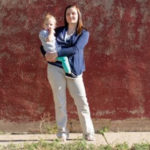PLEASANTON—Looking at Katelyn and Zoe Bachman, it would be hard to tell they hold a distinction shared by no one in else in Texas, and are two of less than 50 in the United States and of less than 200 in the entire world. They are beautiful little girls with a golden glow. But that golden glow sometimes extends to the whites of their eyes, and there is the first hint of what sets them apart.
They are the only two children in Texas to be diagnosed with Crigler-Najjar Syndrome —an inherited metabolic disorder caused by a liver enzyme deficiency that prevents the usual breakdown of bilirubin, a normal by-product in the body’s disposal of worn-out red blood cells.
|
A rare disease is causing the Bachman family to lean more on God, and helping Jeff Bachman be a better youth minister.
|
Children with CNS are unable to eliminate bilirubin from their bodies and must undergo daily exposure to special blue lights just to survive. Without daily treatments, a child would suffer brain damage, muscle and nerve damage and ultimately death due to bilirubin toxicity.
Neither Jeff Bachman, minister of youth and evangelism at First Baptist Church in Pleasanton , nor his wife, Tammy, a first-grade teacher, knew they were carriers of the disease. In addition to Katelyn, 6, and Zoe, 3 months, the Bachmans also are the proud parents of Shannon, 8, and Caleb, Katelyn’s twin brother.
Sleeping under the lights
Katelyn and Zoe sleep under special blue lights eight to 10 hours each night to help their bodies breakdown the bilirubin.
For the lights to do their jobs, clothing and blankets can’t get in the way. Because Katelyn can’t wear pajamas or even have a blanket or sheet to cover her, heaters must be brought in during the winter to help keep her warm—an inconvenience to her siblings who share the same room.
The girls also get as much sunlight as possible, but the sunlight is less effective than the artificial blue light because it is less intense.
To the casual observer, they seem to healthy little girls—which they are, apart from their livers not performing an essential function.
Sign up for our weekly edition and get all our headlines in your inbox on Thursdays
“But it’s hard for them spend the night with grandparents, Katelyn can’t go to sleepovers, and we can’t take a week of vacation and go somewhere, because it’s a lot of work to disassemble the lights, pack them up—they are big even taken apart—and then to put them back together again,” Jeff Bachman said.
And the danger of not putting them under the lights each day is just too great.
The Bachmans are exploring ways to help the girls live a more normal life.

Zoe spends up to 10 hours a day under special blue lights that allow her body to process bilirubin, a job normally done by the liver.
|
A family in Australia has reported some success with a special lighted bed, much like a tanning bed, that because of its close proximity and brightness, they say has cut down on the amount of time needed under the blue lights to as little as a couple of hours each day.
The family has bought a tanning bed, but they need to change the lights in it out to bili-blue bulbs. Most bili-blue bulbs are two-feet long, but the bulbs for the tanning bed need to be six feet long and cost $25 each. Since 32 bulbs are needed, with shipping, the price to change out the bulbs will be about $1,000.
Discussing a liver transplant
The Bachmans also are talking to doctor in Pittsburgh, Penn., about a liver transplant Katelyn, possibly as early as this fall.
“If she gets a new liver, she’s cured,” Bachman said. “We had thought about waiting until she was a little older, maybe a teenager, but the doctor has told us that the recovery period from a liver transplant can be as much as a year. And it’s much easier to take a year out of a 6-year-old’s life than it is a 16-year-old’s.”
Both plans will take additional funds, and the community of Pleasanton is coming together to help with that through a fundraising event July 12 at Pleasanton River Park.
A local high school journalism class heard about the girls, and those students did the initial planning. But as more people became involved, the scope has grown to include a barbecue dinner, dance, raffle, silent auction, karaoke, inflatable games, bake sale, face painting and more.
“We want it to not just be a benefit for our family, but a good family time for everyone involved,” Bachman said.
The congregation at First Baptist Church in Pleasanton always has been supportive, but that has been especially true since Zoe’s birth, he noted.
“A lot of people in our church, when they hear about Katelyn’s condition, they say, ‘Oh, she still has that.’ I guess a lot of them thought it was something she outgrew because we don’t make a big deal about it, we just deal with it. But now that Zoe has been diagnosed with the same thing, they are becoming much more aware,” he explained.
The Bachmans also have learned much more about the disease. Since Zoe and Katelyn are the only two in Texas, often the Bachmans are experts when something comes up.
“A lot of times, the doctors ask us questions,” he said.
The girls have their blood checked to determine their bilirubin levels, but their parents have gotten pretty good at looking at them and seeing a potential problem in the making.
Pre-empting hospital trips
Katelyn had to be hospitalized several times during winter months when she caught a virus and developed a fever. The Bachmans now have learned to pre-empt those hospital times by putting her under the bili-blue lights continuously when she begins to look puny.
While the girls have a different set of “opportunities” than other children, the Bachmans said they know God is with them as they seek to be the best parents they can be to all four of their children.
“There are some things we are called to that we don’t get a choice about, and we just get to deal with them. God has given us two special little girls and that’s what we’re called to do—love and take care of them to the very best of our abilities,” Bachman said.
“It’s caused me to rely on God for so many things and really has helped my prayer life. The Bible tells us he will not give us more than what we can handle, and through all this he has helped me grow.”
It has even helped him be a better youth minister, Bachman believes.
“Anything that happens in my life is reflected in my ministry. It’s one of the ways I’m able to help students relate to the struggles in their own lives. I’m able to better minister to them because of this, he said.”
And even in hard things, God’s blessings are there, Bachman explained.
“It was hard when we found out Zoe had it, but Katelyn was happy—she smiled from ear to ear because she had someone like her, and to me that was a big deal. As they get older, they will be tied together as more than just sisters.”














We seek to connect God’s story and God’s people around the world. To learn more about God’s story, click here.
Send comments and feedback to Eric Black, our editor. For comments to be published, please specify “letter to the editor.” Maximum length for publication is 300 words.